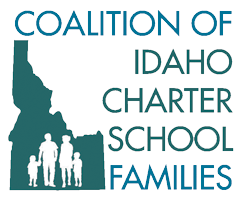September Update!
/Parents, students, teachers and charter school advocates. The Coalition of Idaho Charter School Families has been closely watching the Idaho Public School Funding Formula Committee since its inception a few years back. It is now time for them to come up with a plan and change our funding from attendance-based to enrollment based funding.
This type of funding is helpful for virtual charter schools and for rural schools in Idaho as the state pays based on how many students are enrolled at the school. The committee is wanting to allow weighted programs to receive more funding per student enrolled in the follow areas: technology programs, students enrolled in a class with a teacher that qualifies for the career ladder program, students enrolled in career counselling programs, English Language Learners and of course, at-risk students. This is critical for the schools represented by the coalition as there are many at-risk students that get left behind in Idaho.
The committee needs to hear parents stories as we progress towards the next meeting. If you or someone you know are interested in attending the next meeting for the Idaho Public School Funding Formula Committee please reach out to us. We NEED your support!! Let's help our kids obtain better funding!
The next meeting:
Thursday, October 25th, 2018
State Capitol
Room EW 42
700 W. Jefferson St.
Boise, Idaho 83720
Please e-mail murphy@wittmeyerassociates.com if you have any questions!
PIVOTAL K-12 FUNDING SPREADSHEET REMAINS UNAVAILABLE TO PUBLIC
Kevin Richert 09/24/2018 via Idahoednews.org
Lawmakers spent most of a Monday morning public hearing playing around with numbers — to see what a new funding formula would do for, or to, individual school districts.
But anyone else who wants to do the math is out of luck.
That’s because the legislators and their consultants are tinkering around with a spreadsheet that isn’t available to the public.
Ultimately, the math affects nearly 300,000 students across the state. A new funding formula — if adopted by the 2019 Legislature — could change the way the state distributes more than $1.5 billion in taxpayer dollars that go to K-12.
Which takes us to Monday — and the public but not wholly transparent legislative math exercise.
For months, consultants with the Denver-based Education Commission of the States has been working on a possible formula rewrite. The 2017 Legislature earmarked $400,000 for the consultants’ work.
The ECS spreadsheet represents the centerpiece of the consultants’ taxpayer-funded work product. And it was the focal point of the committee’s discussion Monday morning. Lawmakers ran through a range of scenarios — looking at how the numbers would change depending on a host of adjustments.
For example, if the state earmarks more money to help English language learners, districts with a higher percentage of ELL learners would stand to benefit. And all districts would do better if lawmakers put another $100 million into the K-12 budget — but there would still be winners and losers. Even with a $100 million infusion of money, some districts could get fewer dollars than they received the previous year, depending on the overall structure of the formula.
The 10 members of the Legislature’s school funding formula committee have had access to the ECS spreadsheet, before Monday morning’s hearing at the Statehouse. At least one lawmaker in the audience, House Education Committee member Lance Clow, R-Twin Falls, had access to the spreadsheet and followed along on his laptop. The rest of the audience watched the number-crunching as it unfolded on three projector screens in the committee room.
The spreadsheet could be publicly available in about a week, Michael Griffith of ECS told Idaho Education News. Consultants are still working on adjustments, and Griffith says he has been reluctant to release the spreadsheet until it’s finished.
The funding formula rewrite is in its third year. And the process also came under scrutiny earlier this year.
This June, ECS consultants held a series of closed-door focus group sessions with school administrators. The public and the news media were barred from these sessions, and even committee members and State Department of Education staffers were not allowed to attend. The Idaho Press Club, a media statewide organization, asked lawmakers to reconsider this approach, but the closed meetings went on as planned.
https://www.idahoednews.org/news/pivotal-k-12-funding-spreadsheet-remains-unavailable-to-public/

